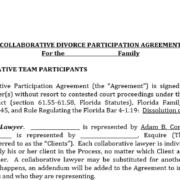Do My Business Bank Accounts Get Divided In A Florida Divorce?
If you own a business and are facing divorce, you may be wondering whether your business bank accounts—the checking, savings, operating, or money market accounts tied to your company—could be considered “marital assets” and divided.
For many professionals, these accounts represent far more than just money. They reflect years of effort, payroll obligations, and the foundation of your financial life. Understanding how Florida law treats business bank accounts can help you protect what you’ve built and choose the right path forward.
Quick Answer: Can Business Bank Accounts Be Divided in a Florida Divorce?
Yes. Business bank accounts can be divided in a Florida divorce depending on when and how the business was created, how the accounts were funded, and whether marital income or marital efforts contributed to their growth. Under Florida’s equitable distribution law, the court can treat those funds as marital property even if the accounts are in only one spouse’s name or owned by the business.
How Florida Law Treats Business Bank Accounts in Divorce
Under Section 61.075, Florida Statutes, courts must divide marital assets and debts fairly, though not necessarily equally. Marital assets generally include property or income acquired during the marriage—regardless of whose name is on the account.
That means if your business was formed or operated during the marriage, the funds in its business bank accounts could be considered marital.
If your business predated the marriage, those accounts might begin as nonmarital. Still, any increase in their balance or new deposits during the marriage can be at least partly marital—especially if marital income was added or your marital efforts contributed to the business’ success and growth.
What Happens When Only One Spouse Owns the Business
Many Florida business owners—doctors, lawyers, consultants, and entrepreneurs—operate their companies independently. But even if only one spouse owns the business, those business bank accounts may still have a marital component.
Even when a business was created entirely with premarital funds and the other spouse never worked there, a marital portion can arise. Florida law recognizes that an owner’s marital efforts, such as managing the company or providing professional services during the marriage, can generate income. If that income is deposited into business bank accounts, part of the balance could be considered marital property.
If the accounts were funded solely with premarital money and carefully kept separate, and neither spouse’s efforts caused the business to earn income during the marriage, they’re more likely to remain non-marital. But, keep in mind, commingling marital funds makes it difficult to trace and protect the original value.
Accurate bookkeeping and documentation are key to showing how and when money flowed in and out of these accounts.
When Both Spouses Have an Ownership Interest
If both spouses legally own the business, determining whether the bank accounts get split is clearer: both generally have rights to those funds. Even if the business was created prior to the marriage, likely the act of adding the second spouse as an owner would convert pre-marital funds in a business bank account into marital funds.
The Hidden Privacy Risks of Litigating Business Bank Accounts
In a traditional court-based divorce, disputes over business bank accounts often become part of the public record. Accusations, whether true or not, often make it into petitions for dissolution of marriage, motions, and other public court filings. Further, bank statements, financial statements, QuickBooks files, and tax returns may be entered into evidence and thus become public record or exchanged through formal discovery.
Though certain information, such as account numbers or social security numbers, may be redacted, the remainder of the document remains accessible. Further, each spouse usually hires a separate forensic accountant to do a valuation of the business and its business accounts, doubling both cost and stress.
For high-profile professionals and business owners in Tampa, St. Petersburg, Sarasota, and across Florida, this public exposure can be deeply concerning. No one wants clients, employees, or competitors to access sensitive business, personal, or financial information.
A Private, Efficient Solution: Collaborative Divorce for Business Owners
Collaborative Divorce offers an entirely different approach. Both spouses commit to staying out of court and working together privately. A single Neutral Financial Professional generally collects and organizes all relevant records—including business bank account statements—so there’s no duplication of work or expense.
This professional helps everyone understand the financial picture while keeping sensitive information private, confidential, and out of the public record. The process is faster, more respectful, and much more private.
As a leading Florida Collaborative Divorce attorney, Adam B. Cordover has guided physicians, lawyers, and entrepreneurs through this process. As a co-author of an American Bar Association book and a trainer of Collaborative Professionals across Florida and internationally, he brings deep experience handling complex financial cases while maintaining strict confidentiality.
Flexible Solutions Beyond the Court’s Rules
In a Collaborative Divorce, you and your spouse—not a judge—decide how business bank accounts will be treated. You can agree to keep certain balances in the company for operational stability, determine how future business income will be handled, or craft other creative solutions that courts might not consider.
This flexibility allows you to protect the continuity of your business while reaching a fair outcome for both spouses.
Planning Ahead: Prenuptial and Postnuptial Agreements for Business Accounts
Long before divorce is on the table, you can protect your company’s accounts with a prenuptial or postnuptial agreement. These agreements can define exactly how business bank accounts and other assets would be handled if you ever separate, and they usually override the general divorce law on business bank accounts described above.
They can also be created through the Collaborative Process, giving you and your spouse a respectful and transparent way to set expectations early—without the stress or confrontation of litigation.
Protect Your Business Bank Accounts and Your Future
You’ve worked hard to build your business. Divorce doesn’t have to mean losing control over your company’s finances or privacy. The Collaborative Process helps you protect your business bank accounts, preserve your family and your reputation, and move forward with dignity.
To discuss your options, schedule a private virtual planning meeting or contact Family Diplomacy: A Collaborative Law Firm by calling or clicking the button below.
You are not alone. We can help.
We accept clients throughout the State of Florida (you do not need to be local), and we have offices by appointment in Tampa, St. Petersburg, and Sarasota.





